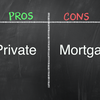Private Lender vs. Institutional Lender

Everything You Need to Know About Mortgage Lenders
Looking for a lender can be a confusing and challenging process. There are so many companies to choose from, and each one offers slightly different conditions on their loans. While the type of loan you choose is important, it is equally important to choose the right lender. One way to improve your odds is to familiarize yourself with the different types of mortgage lenders that exist and some of the main mortgage products that they offer and specialize in:
Retail Lenders
Retail lenders can include banks such as Scotiabank, TD Bank, Royal Bank of Canada (RBC), CIBC (Canadian Imperial Bank of Commerce), Bank of Montreal (BMO), Manulife Bank, and more. This group of mortgage lenders also includes credit unions, and trust companies. This type of lender sells mortgages directly to consumers and/or through mortgage brokerages. In addition to mortgages, retail lenders may also offer other services such as personal loans, auto loans, business loans, commercial loans, etc.
Monoline Lenders, Direct Lenders, and Wholesale Lenders
Unlike retail lenders, direct lenders do not offer other products and services; they are uniquely mortgage lenders. In order to finance the mortgage loan , direct lenders may use their own funds or third-party sourcing.
Unlike portfolio lenders, wholesale lenders offer their mortgages through third parties such as smaller banks, credit unions, or private mortgage brokers. While wholesale lenders create and finance their loans, they have zero interaction with the end consumer. Despite this, it is the wholesale lenders, and not the third-party lenders, that tend to set out the majority of the terms of the loan.
For example, a monoline mortgage lender such as Merix, Lendwise, CMLS, Radius, RFA, Marathon Mortgage, MCAP, and others deal exclusively in the business of mortgage lending, and for the most part do that exclusively through the mortgage broker channel. As a result, they do not have the high overhead costs of banks and are able to often times offer better interest rates and terms than the banks do.
Portfolio Lenders
Portfolio lenders always use their own funding in order to finance the mortgage loans that they provide direct-to-consumer. Because of this, portfolio lenders are not dependent on the needs or requests of third-party shareholders. Working with a portfolio lender affords borrowers greater flexibility, allowing them to customize their loan contracts to suit their personal needs.
Wholesale Lenders
Hard Money Lenders / Private Lenders
When borrowers cannot qualify with other lenders, they often turn to hard money lenders as a last resort. Hard money lenders are risk-loving, private, and often have a large supply of capital. Loans with these lenders are very flexible and close quickly, but interest rates can soar as high as 20%. Furthermore, hard money loans must usually be paid off within a few years, using your property as collateral if you fail to make your payments. Despite the volatile nature of this loan, it is well-suited to certain kinds of borrowers, such as “house-flippers”, builders, certain types of self-employed individuals, and more.
Private vs. Institutional Lender: What’s the Difference?
Institutional lenders such as banks are often portrayed as the industry-standard choice. However, given the recent rise in the overnight rate and the new stress test requirements, more and more buyers are having trouble qualifying for AAA loans. Alternative and private lenders have become increasingly popular among aspiring homeowners and property managers in response to this trend. But what exactly differentiates the two? Here are some of the key differences between private and institutional lenders:
- Credit Requirements : When applying for a loan with an institutional lender, having a good credit score and history is of the utmost importance. On the other hand, private lenders are more likely to look past credit and debt ratios if the borrower can prove their ability to repay the loan in other ways.
- The Importance of Job Stability: Institutional lenders often require very clear proof of income and job stability. Private lenders are more focused on your current finances than on the future stability of your job. When dealing with commercial properties , private lenders may approve your loan even if you do not have a high income, banking on your ability to generate income from your new property investment. In such cases, the property is usually held as collateral on your loan; if you fail to make your payments, your lender will seize ownership of the property.
-
Risk Aversion and Interest Rates:
Institutional lenders are, on average, more risk-averse. They are very strict when it comes to qualifying for a loan to ensure that their borrowers do not default. They also will only approve loans for certain types of properties. On the upside, these risk-mitigation strategies allow them to charge very competitive interest rates. On the other hand, private lenders are more
open to risk
, often working with properties that AAA lenders avoid, such as farmland, vacant lots, and other types of commercial ventures. To compensate for this added risk, they often charge higher interest rates but can always guarantee a quick close.
How to Decide Which Lender is Right for You
In order to be successful in the real estate space, it is important to be well-informed before choosing a mortgage. Whether you are looking for a new home or a commercial property investment, finding the right lender can save you thousands of dollars in the long run.
Because of the increasingly high standards for mortgage qualification , many borrowers are considering private lenders as an alternative to traditional banks and other institutional lenders. Private leadership is especially trendy amongst commercial real estate investors; the implied returns from a commercial property often mitigate the increased rates of a private lender.
When choosing between private and institutional lenders, it is important to consider the type of property you are looking to purchase, as well as your personal financing needs. Borrowers looking to buy and quickly flip a home may prefer the short closing times of a private lender, while a buyer looking for a home to retire in may prefer the stability of an institutional loan.
It is furthermore important to consider your current financial standing. If you have a poor credit score or a volatile income stream, you may not qualify to work with an institutional lender— simplifying your decision.
There are also other types of lenders to consider. If you want to handle all your financial services in one place, you may prefer a retail lender over a direct one. If you value flexibility in your loan structure, you may prefer working with a portfolio lender over a wholesale lender. If you are looking for a quick turnaround on your commercial farmland investment, a hard money lender may be the right choice for you.
Even once you have chosen the best type of lender, you still need to decide on a company, a lender, and a loan contract. The best way to make sure your mortgage is perfectly suited to your needs is to consult with mortgage professionals. Our expert brokers can help you develop a personalized mortgage plan and connect you with the perfect lender.
Contact Clover Mortgage today to speak with a knowledgeable and reliable mortgage broker for a free consultation.
References





